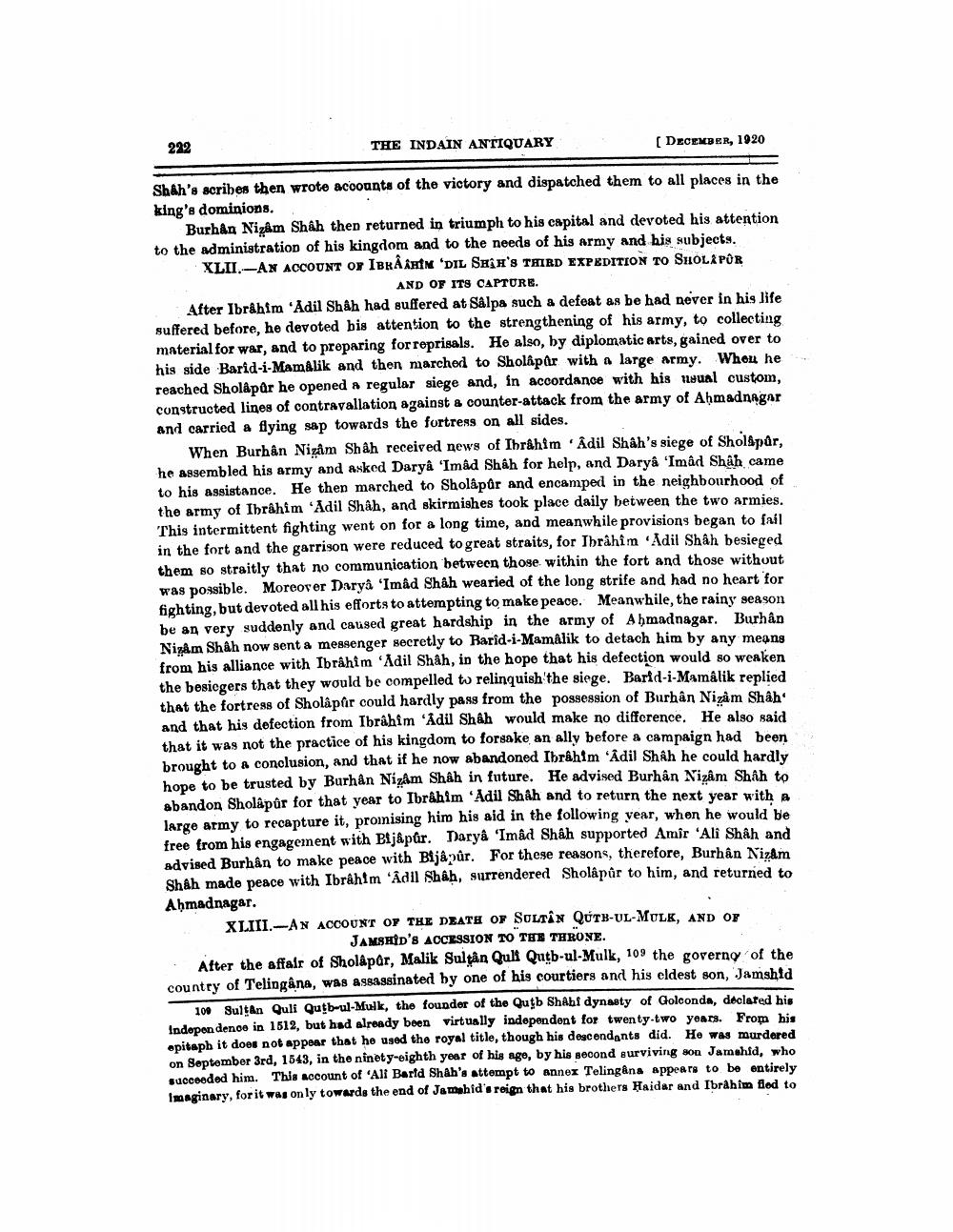________________
222
THE INDAIN ANTIQUARY
( DECEMBER, 1920
Shah's scribes then wrote acoounts of the victory and dispatched them to all places in the king's dominions.
Burhan Nizam Shah then returned in triumph to his capital and devoted his attention to the administration of his kingdom and to the needs of his army and his subjects. XLII.-AN ACCOUNT OF IBRAHIM 'DIL SHH's THIRD EXPEDITION TO SHOLAPOR
AND OF ITS CAPTURE. After Ibrahim Adil ShAh had suffered at Sâlpa such a defeat as be had never in his life suffered before, he devoted bis attention to the strengthening of his army, to collecting material for war, and to preparing for reprisals. He also, by diplomatic arts, gained over to his side Barid-i-Mamalik and then marched to Sholåpar with a large army. When he reached Sholapar he opened a regular siege and, in accordance with his neual custom, constructed lines of contravallation against & counter-attack from the army of Ahmadnagar and carried a flying sap towards the fortress on all sides.
When Burhân Nizam Shah received news of Ibrahim Adil Shah's siege of Sholapar. he assembled his army and asked Darya 'Imad Shah for help, and Darya 'Imad Shah came to his assistance. He then marched to Sholapur and encamped in the neighbourhood of the army of Ibrahim Adil Shah, and skirmishes took place daily between the two armies. This intermittent fighting went on for a long time, and meanwhile provisions began to fail in the fort and the garrison were reduced to great straits, for Ibrahîm Adil Shâh besieged them so straitly that no communication between those within the fort and those without was possible. Moreover Darya 'Imad Shah wearied of the long strife and had no heart for fighting, but devoted all his efforts to attempting to make peace. Meanwhile, the rainy season be an very suddenly and caused great hardship in the army of Ahmadnagar. Burhan Nizam Shah now sent a messenger secretly to Barid-i-Mamâlik to detach him by any means from his alliance with Ibråhim 'Adil Shah, in the hope that his defection would so weaken the besiegers that they would be compelled to relinquish the siege. Barid-i-Mamalik replied that the fortress of Sholâpar could hardly pass from the possession of Burhân Nizam Shah and that his defection from Ibrahim 'Adil Shah would make no difference. He also said that it was not the practice of his kingdom to forsake an ally before a campaign had been brought to a conolusion, and that if he now abandoned Ibrahim Adil Shih he could hardly hope to be trusted by Burhan Nizam Shah in future. He advised Burhan Nizâm Shah to abandon Sholâpôr for that year to Ibrahim 'Adil Shah and to return the next year with a large army to recapture it, promising him his aid in the following year, when he would be free from his engagement with Bijâpôr. Daryâ 'Imad Shah supported Amir 'Ali Shâh and advised Burhan to make peace with Bijâpûr. For these reasons, therefore, Burhan Nizam ShAh made peace with Ibrahim 'Adil Shah, surrendered Sholậpûr to him, and returned to Ahmadnagar. XLIII.-AN ACCOUNT OF THE DEATH OF Sorin QÚTB-UL-MULK, AND OF
JAMSHID'S ACCESSION TO THE THRONE. • After the affair of Sholapar, Malik Sultân Quk Qutb-ul-Mulk, 109 the governgy of the country of Telingana, was assassinated by one of his courtiers and his eldest son Jamshid
106 Sultan Quli Qutb-ul-Mulk, the founder of the Qutb Shabf dynasty of Golconda, decleted his Indopon denoo in 1512, but had already been virtually independent for twenty-two years. From his epitaph it does not appear that he used the royal title, though his descendants did. He was murdered on September 3rd, 1543, in the ninety-eighth year of his age, by his second surviving son Jamshid, who succeeded him. This account of 'Ali Barld Shah's attempt to annex Telingana appears to be entirely Imaginary, for it was only towards the end of Jamahid's reign that his brothers Haidar and Ibråhim fled to
, AND OF




